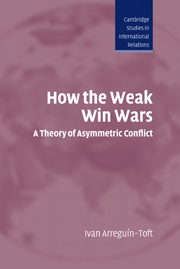Book contents
- Frontmatter
- Contents
- List of figures
- Preface
- Acknowledgments
- List of abbreviations
- 1 Introduction
- 2 Explaining asymmetric conflict outcomes
- 3 Russia in the Caucasus: the Murid War, 1830–1859
- 4 Britain in Orange Free State and Transvaal: the South African War, 1899–1902
- 5 Italy in Ethiopia: the Italo-Ethiopian War, 1935–1940
- 6 The United States in Vietnam: the Vietnam War, 1965–1973
- 7 The USSR in Afghanistan: the Afghan Civil War, 1979–1989
- 8 Conclusion
- Appendix
- References
- Index
- CAMBRIDGE STUDIES IN INTERNATIONAL RELATIONS
4 - Britain in Orange Free State and Transvaal: the South African War, 1899–1902
Published online by Cambridge University Press: 22 August 2009
- Frontmatter
- Contents
- List of figures
- Preface
- Acknowledgments
- List of abbreviations
- 1 Introduction
- 2 Explaining asymmetric conflict outcomes
- 3 Russia in the Caucasus: the Murid War, 1830–1859
- 4 Britain in Orange Free State and Transvaal: the South African War, 1899–1902
- 5 Italy in Ethiopia: the Italo-Ethiopian War, 1935–1940
- 6 The United States in Vietnam: the Vietnam War, 1965–1973
- 7 The USSR in Afghanistan: the Afghan Civil War, 1979–1989
- 8 Conclusion
- Appendix
- References
- Index
- CAMBRIDGE STUDIES IN INTERNATIONAL RELATIONS
Summary
They were conquerors, and for that you want only brute force – nothing to boast of, when you have it, since your strength is just an accident arising from the weakness of others. They grabbed what they could get for the sake of what was to be got. It was just robbery with violence, aggravated murder on a great scale, and men going at it blind – as is very proper for those who tackle a darkness. The conquest of the earth, which mostly means the taking it away from whose who have a different complexion or slightly flatter noses than ourselves, is not a pretty thing when you look into it too much. What redeems it is the idea only. An idea at the back of it; not a sentimental pretense but an idea; and an unselfish belief in the idea – something you can set up, and bow down before, and offer a sacrifice to …
Conrad, Heart of Darkness (1985)The war between the British Empire and the governments of Transvaal and Orange Free State which began on October 11, 1899, was once called the Anglo-Boer War, or Boer War for short, but historians now call it “The South African War ” in recognition of the important role played in it by black Africans.
The South African theater
European interest in South Africa has its origins in the development of trade contacts with India and the Far East.
- Type
- Chapter
- Information
- How the Weak Win WarsA Theory of Asymmetric Conflict, pp. 72 - 108Publisher: Cambridge University PressPrint publication year: 2005



